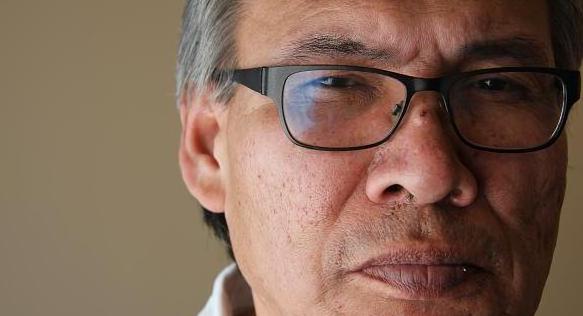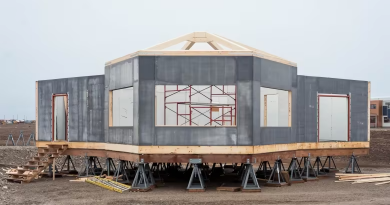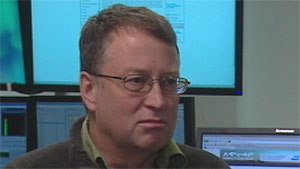How history continues to impact Canada’s First Nations, interview with Walter Bayha

Name: Walter Bayha
Occupation: Director of Implementation, Deline Land Corporaration
Hometown: Deline, Northwest Territories, Canada
Quote: “We can’t develop one area and neglect another, destroy one area and build another. I think we need to teach our young people why that’s so important.”
Listen: Walter Bayha on how government policies negatively affected the Dene transition into the wage economy: {play}/media/jukebox/Walter.
Intro: The transition from a life based on sharing, self-sufficiency and harmony with nature, to the wage economy of Europeans, was a traumatic one for many Inuit and First Nations communities in Canada and around the circumpolar world. The gulf between these two ways of seeing the world continues to impede employment and economic opportunities in remote aboriginal communities say leaders. Here, Walter Bayha, 58, and a member of the Sathu Dene First Nation in northern Canada, tells us why that needs to change and how understanding his people’s history is the first step.
What are some of the recent historical events that have affected how First Nations groups like Dene are able to participate in the economy in the Sathu region of the Northwest Territories?
We have to go back to 1921 and Treaty 11. Oil development triggered the treaty.
The other big important milestone in our history would be the influx of people coming into the area, like when the Northwest Territories government moved north in 1967. Events like this brought in all kinds of acts like the wildlife ordnances that were made without any attention to the treaty articles saying our people would not lose their right to hunt, fish or trap on their lands. Nobody paid attention to the treaty between 1921 and the land claims settlement in 1993. That eroded the treaty, eroded the Dene culture, eroded everything that the Dene were during that period.
What effects did this have?
The Wildlife Act in the 1960s was made by the dominant (white) society and had nothing to do with the Dene people. I worked for the government of Northwest Territories and actually enforced these laws for 25 years. The Wildlife Act is not to protect wildlife, it’s to protect people.
What do you mean?
The Dene build relationships with land and the wildlife. They’re part of it. The dominant (European) society isn’t part of nature. They see themselves as masters of the environment and we see that very clearly in the act. That has a major impact on the Dene way of thinking and doing things. For example, telling Dene they can only harvest at certain times and in certain ways. The Dene people don’t need that.
Pre-contact, our people were hunters and gathers and travelled thousands of miles in a year to harvest from the mountains or the caribou on the barren lands or even char. That’s how they made a living and they survived like that for many thousands of years so they must have been doing something right.
What other barriers do Dene in your region need to overcome?
Residential schools. They were trying to get rid of the Dene-ness of our people. They don’t want Dene. They want a dominant society type person that is going to be just like anyone else in Canada. Everything that happens in Deline, even today, comes in from outside. How many of us speak our language ? Am I speaking my language now? No. Do we operate in our own language? No.
I’m sad to say, I go back in my history and I don’t think you can find someone who is not assimilated already.
What do you remember about when the so-called wage economy began to over-take the traditional ways that Dene here supported themselves?
In the 1960s that was already starting to happen. Not only trading to get goods from the dominant society (white people) but also the wage economy started to become much bigger.
People wanted work. A lot were employed in the summer as guides. Later, more and more young people wanted what the dominant society had so it started to pick up. Than other factors started to appear like territorial housing. I remember my dad saying ‘I don’t know why they want us to move into these new houses’. But that had a major impact, especially on self-sufficiency.
What do you mean?
They took away one of the things that Dene people treasure which was having a nice tent: the teepee. When I’d go trapping with my grandfather I used to say ‘How come we pitch up tent almost everyday?’ He said: ‘Everyday we have a brand new house to live in.’ I think they were so proud of that.
But when the government put up houses, provided services, kept us in communities, the thinking among our people changed to, ‘We’ll get government to do it for us’.
They’ve trained our people very well haven’t they? But now the dominant society has got a big problem. They don’t like what they created .
Is it possible to merge what you call ‘the Dene way of life’ with today’s wage economy?
I think it’s possible to be Dene but also be in the modern world today. People here in Deline have done that very well. We still have the resources. We still have Great Bear Lake with no commercial fishing. Caribou, natural resources and non-renewable resources are all still here.
If we can get our people, especially our young people, not so much to go back to the land and live like my grandfather, but just to make it part of their life, I think it would be a good direction.
We’ve even talked of paying them if they stay out on the land. Why not? Not only would they be promoting being a Dene but they’re also being part of the land again. Being stewards of the land.
Why is that so important?
I hope our history teaches us that we can’t develop one area and neglect another, destroy one area and build another. I think we need to teach our young people why that’s so important . You have to know your history, back to pre-contact. You have to go back to yourself as a Dene and ask yourself ‘What am I doing?’ You’ve got to speak your language and then you begin to understand what it means in your own life.
Write to Eilís Quinn at eilis.quinn(at)cbc.ca



